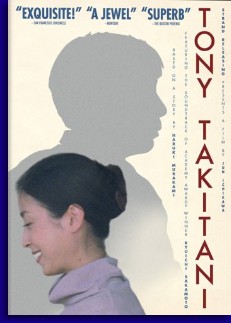

Reviewed by
Christopher Armstead


Tony Takitani is a little gem of movie. Beautifully framed and photographed, acted with understated elegance, wonderfully scored and mercifully brief, this is a small quiet film that hits all of the right notes.
Tony Takitani (Issei
Ogata), even from childhood has spent the majority
of his life alone.
His mother died soon after he was born and
his father, a jazz trombonist, spent the majority of
Tony’s life pursuing his passion. Named
after an American Army officer, Tony’s father
thought that the American name would make Tony
special, when all it did was distance him from his
natively christened peers. As Tony enters adulthood,
everything in his life from how he lives, to his
career as a graphic artist is centered on being
alone. And
it would appear that Tony is very comfortable being
by himself, until a breeze delivers Hisako Konuma
(Rie Miyazawa) to his office. Hisako is
beautiful, witty, smart and impeccably dressed. To a
fault it would seem.
Though
15 years his junior, Hisako falls in love with
Tony as well and the two marry. Tony’s
love for Hisako is so great and complete that the
thought of being alone again petrifies him. Tragedy,
sadly, places Tony back into an all too familiar
place.
Taken from a short story by famed Japanese writer Haruki Murakami, Director Jun Ichikawa’s constantly moving camera perfectly captures the essence of Tony’s life. A life that starts out simply being alone, but ends up in loneliness. Ryuichi Sakamoto’s perfectly integrated, but unobtrusive score paints the edges of Ichikawa’s pictures giving them more depth and meaning. The story is driven by the clever narration of
Hidetoshi Nishijima who
often has his narrative thoughts completed by the
characters on the screen. I’ve often said that movies
are about actors. All
of the clever direction, music, and special effects
will be lost if the actors on the screen can’t
deliver the film.
This particular movie will rise or fall on
the character of Toni Takitani, and Issei Ogata
carries the character to new heights. Not once
does his characterization of Tony make one feel the
contrivance of pity or sadness. He simply
lays out the life of a man who has found little use
for people in general. Contrast that to the life of a
man in love and his change is completely plausible
and believable.
Parallel that with Tony’s life at the
beginning of the film, to Tony’s life at the end and
though the character at different points in time is
in the same situation, the change in the man himself
is remarkably different. Better to have loved and lost,
than not to have loved at all? Indeed. It takes
an actor of great skill execute these changes in
emotion subtlety, and not wild mood swings and
uncharacteristic changes in behavior. At the
same time never straying from Tony’s quiet core, but
convincing the viewer of his delicate fragility
nonetheless.
Clocking at a scant 75
minutes in length, Ichikawa probably could have easily
padded the film, but somehow the length seemed just
right. The
movie wasn't boring in the least, but it did seem I
spent more than an hour and fifteen minutes with Tony. Again, I
think different viewers will get different feelings
from watching this film, and a repeated viewing would
certainly be encouraged. Tony Takitani is that rare quiet
independent film that has more to say in its silence
than similar films could relay in chapters of verse.

